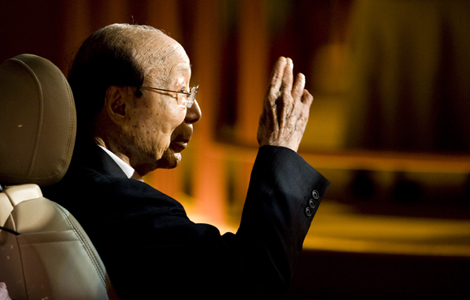Superconductivity era will speed up changes
Updated: 2014-01-11 02:47
By Cheng Yingqi (China Daily)
|
|||||||||||
There is no doubting the contribution made to everyday life by semiconductors, used mainly as components for radio receivers, televisions and cell phones, over the last 50 years or so.
But now physicists can barely contain their excitement over the expected contribution of superconductors.
Superconductivity basically refers to the electric resistance of a material suddenly being reduced virtually to zero under certain circumstances, said Zhao Zhongxian, a superconductivity physicist and member of the Chinese Academy of Sciences.
With components made of superconductors, the accuracy of atomic clocks on satellites will be enhanced, central processing units on computers will be accelerated and the precision of gyroscopes on navigation devices will be increased.
Despite the wide range of possible applications for superconductors, physicists, however, once believed that superconductivity could only occur at supercold temperatures — no higher than -233 C.
In 2008, Japanese scientist Hideo Hosono achieved a breakthrough with an iron-based superconductor that functions at -247 C.
Chinese scientists later discovered even better-performing superconductors.
"You might think -218 C is still a very low temperature, but it is relatively 'warm’ and is already possible for industrial use," said Wang Nanlin, a researcher from the Institute of Physics, Chinese Academy of Sciences.
"Now a superconducting cable with a diameter of a pen allows transmission of a 10,000-amp current without any loss of electricity."
Related Stories
Prize-winning chemist heads science foundation 2014-01-10 19:47
Founder of China's nuclear science receives award 2014-01-10 19:35
China confers top science award 2014-01-10 18:24
Facts about the State science and technology awards 2014-01-10 16:17
Xi urges science innovations after lunar probe success 2014-01-06 20:59
Today's Top News
Apology urged for insulting Chinese
China to enhance role in Mideast
Higher targets for emission reduction
Analysts weigh in on reform effacts
New ambassador to the EU takes up reins
Top court seeks judicial transparency
China has most outbound tourists
Turkey removes police chiefs amid graft probe
Hot Topics
Lunar probe , China growth forecasts, Emission rules get tougher, China seen through 'colored lens', International board,
Editor's Picks

|

|

|

|

|

|





